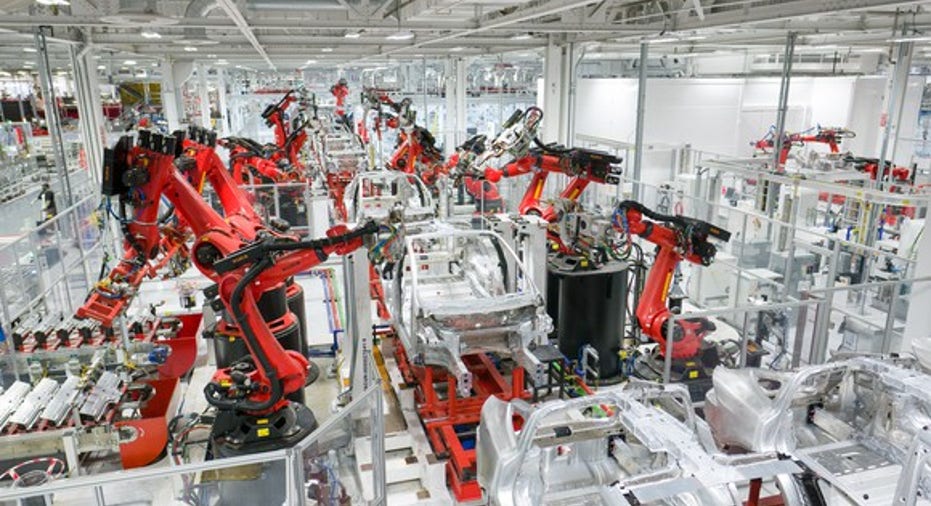Why Tesla Motors, Inc.'s Model 3 Reservations Are Irrelevant -- for Now

When electric-car maker Tesla Motors (NASDAQ: TSLA) unveiled its Model 3 earlier this year, demand for the vehicle exceeded all expectations -- including Tesla management's. Raking in 373,000 reservation deposits of about $1,000 each in just a month-and-a-half after the vehicle's unveiling, Tesla responded by doubling down on its production plans, opting to move its target for an annualized build rate of 500,000 vehicles two years earlier, from 2020 to 2018.
Model 3. Image source: Tesla Motors.
This high level of demand for Model 3 undoubtedly impacted the company's prospects. Beyond serving as a catalyst for Tesla to accelerate its production ramp-up, this shocking level of consumer interest in Tesla's first mass-market vehicle meant investors could shelve the risk of underwhelming initial demand for the important vehicle. But between now and when Tesla gets closer to bringing Model 3 to market, an update on how many customers have maintained their refundable deposits for the vehicle wouldn't be helpful.Here's why.
Tesla doesn't need more reservations
During its most recent quarterly earnings call, Tesla refused to answer what is turning into a quarterly question from analysts about whether the company will provide an update on Model 3 deposits.
"As for the 3 deposit number, this is not something we comment on and not something that is a figure of merit in any way," Tesla CEO Elon Musk said during the company's third-quarter earnings call (via a Reuters transcript). The response nearly mirrored what Tesla said about Model 3 deposits in the second quarter.
It's tempting to quickly conclude that Tesla is withholding material information from investors by not disclosing where this metric is today. But this conclusion would fail to acknowledge other important information about Model 3 reservations, namely that Tesla isn't trying to increase demand for the vehicle.
Sure, Tesla's initial disclosure of the 373,000 deposit-backed reservations its Model 3 garnered within 45 days of its unveiling provided some context, but disclosure beyond this figure wouldn't be helpful, at least for now.
Musk articulated Tesla's reasoning for not disclosing this figure during the third-quarter earnings call:
In other words, until Tesla is actually trying to facilitate new reservations for Model 3, an update on Model 3 reservations wouldn't accurately portray the trajectory of demand the vehicle could solicit in a scenario where Tesla tried -- at all -- to generate incremental orders.
Further rendering an update on Model 3 reservations irrelevant, Tesla is making targeted efforts at getting some Model 3 reservation holders to cancel. Not only did Musk recently say the company is anti-selling its Model 3 in stores right now by trying to convert Model 3 interest into orders for its Model S and Model X, but the company also introduced a lower-cost Model S earlier this year aimed directly at converting Model 3 reservations to Model S reservations.
Tesla head of global sales Jon McNeill explained Tesla's efforts to convert Model 3 reservation holders to Model S customers in the company's second-quarter earnings call (via a Reuters transcript).
But what about increasing competition?
Some investors might argue that, with the upcoming deliveries of General Motors'(NYSE: GM) similarly priced all-electric Chevrolet Bolt just weeks -- or even days -- away, that an update on Model 3 reservations could help investors decipher whether or not competition is negatively impacting Model 3. But the very fact that Tesla hasn't marketed Model 3 in any meaningful way in the wake of the Bolt's imminent market launch shows Tesla isn't worried about Model 3 demand.
Further, with Tesla still aiming to achieve volume production of Model 3 in the second half of 2017, and still aiming for a 500,000-unit annualized build rate in 2018, Tesla obviously hasn't seen rising competition impact the company in a way that alters management's expectations for demand.
Tesla factory. Tesla's reported 373,000 deposit-backed reservations for Model 3 dwarfs the company's current annualized build rate of 100,000 units. Image source: The Motley Fool.
Finally, it's not clear yet that increasing competition in the all-electric vehicle space will negatively impact Tesla in the first place. Competition could reasonably have the opposite effect, increasing awareness for the segment by endorsing a vehicle type that Tesla has bet its company on. This could, in turn, boost overall interest in the very small category, and more than make up for any sales Tesla loses to competition.
When will an update on Model 3 reservations be useful for investors? Investors should begin looking for an update on Model 3 reservations when Tesla management starts showing it cares about the trajectory of demand for the vehicle.
10 stocks we like better than Tesla Motors When investing geniuses David and Tom Gardner have a stock tip, it can pay to listen. After all, the newsletter they have run for over a decade, Motley Fool Stock Advisor, has tripled the market.*
David and Tom just revealed what they believe are the 10 best stocks for investors to buy right now... and Tesla Motors wasn't one of them! That's right -- they think these 10 stocks are even better buys.
Click here to learn about these picks!
*Stock Advisor returns as of Nov. 7, 2016
Daniel Sparks owns shares of Tesla Motors. The Motley Fool owns shares of and recommends Tesla Motors. The Motley Fool recommends General Motors. Try any of our Foolish newsletter services free for 30 days. We Fools may not all hold the same opinions, but we all believe that considering a diverse range of insights makes us better investors. The Motley Fool has a disclosure policy.



















